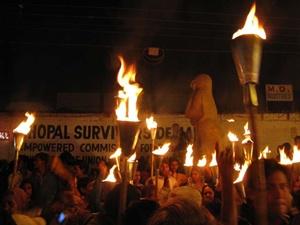Lessons of industrial accidents not learned

Corporate wrongdoers should be held fully accountable, both in terms of financial responsibility and for the actions of their executives. By Justin Frewen.
Almost 26 years ago a poisonous cloud of methyl isocyanate poured forth from the Union Carbide plant in Bhopal, India. On the night of 3 December 1984, some 4000 people lost their lives and a further 300,000 were injured. The people of Bhopal received no warning, as the plants safety systems failed and no alarm was given. An Amnesty report estimated the death toll had risen to 22,000 by 2004.
This disaster had a devastating legacy on Bhopal. In addition to the immediate deaths and destruction of the environment, the surrounding soil and waters remain contaminated by Union Carbide’s chemical waste. This has given rise to genetic deformities, cancer and congenital health problems, as well as many painful premature fatalities.
(Picture: survivors of the Bhopal gas tragedy of 1984)
Worse, the people of Bhopal still await adequate compensation and assistance in cleaning up the chemical wastes. Those primarily responsible have never been brought to account. Although seven local company officials were recently found guilty of their role in the Bhopal disaster, they received prison sentences of two years and a US$2,100 fine – approximately what one might expect for a car accident in India. The far more culpable US executives have avoided legal censure.
Indeed, the US executives have never been seriously pursued. When Warren Anderson, then the Union Carbide CEO, visited India after the Bhopal disaster, he was spirited out of the country lest 'overzealous' officials might try and detain him. Anderson has since been protected by the US political and business community. Today, in his early 90s, Anderson, is free to enjoy his retirement in Florida. One hopes the BP Horizon Deepwater disaster has not inconvenienced him in his twilight years.
The recent BP Horizon Deepwater environmental disaster is the latest in a long line of industrial accidents since Bhopal. The BP gush – 'leak' is an absurd understatement for the estimated 53,000 barrels of oil surging into the Gulf of Mexico before it was capped – resulted in 11 fatalities and 17 injuries. It caused untold damage to the marine and wildlife habitat as well as the local fishing and tourist industries.
Similarities and Differences
Both Union Carbide and BP received adequate warning of the risk of a disaster. Over 10 years before Bhopal, a Union Carbide report signed by Warren Anderson himself highlighted the unproven nature of Bhopal's technology. A 1982 safety review by Union Carbide's own experts emphasised the serious risk of substantial leaks of “toxic materials" at Bhopal. BP received adequate warning of impending problems, as numerous internal investigations alerted senior BP managers of the flouting of safety and environmental rules at Horizon Deepwater.
In the wake of both disasters, BP and Union Carbide downplayed the consequences. BP's Chief Executive, Tony Hayward, pacified the anxious US east coast public, claiming the oil leak would be relatively inconsequential. After the Bhopal leak, Union Carbide's public relations people asserted that methyl isocyanate was not poisonous but merely resembled a strong tear gas.
There has been one major difference, however. BP has been subjected to a far rougher ride than Union Carbide. The same US political-business community that protected Anderson has been harshly critical of BP and Hayward. President Obama has declared his desire to find a BP ass to kick and his intention to keep his “boot on BP's throat.” While the UN's public indignation is perfectly understandable, one can only wonder at the reaction if the Indian government and its business leaders had reacted similarly to Bhopal.
As the best-selling Chetan Bhagat author highlighted: "It looks like Indian children's lives are cheaper than [those of] fish. Obama should bang his fist on the table. If he can do that for fish, how about our kids? Or are they only Indians?"
Union Carbide's current owners, Dow Chemicals, maintain that the 1989 settlement of US$470 million paid to the Indian government settled the Bhopal compensation issue. This claim is open to dispute. The award was based on a discredited under-estimation of 3,000 fatalities at Bhopal. Given the current estimated 574,367 victims since the Bhopal disaster, including dead and injured, the average compensation amount would come in at just over US$800 per person. This sum would also have to help cover the cost of cleaning up the lands and waters around Bhopal. Moreover, the Indian government negotiated and accepted this settlement without involving the people of Bhopal.
On the other hand, the Obama administration obliged BP to establish a US$20 billion compensation fund.
What Can Be Done?
The Bhopal and BP disasters contain a number of lessons. Corporate wrongdoers should be held fully accountable, both in terms of financial responsibility and for the actions of their executives. Nothing less than a transparent and easily enforceable framework of international sanctions and penalties will suffice to ensure that corporations are made accountable in the future, irrespective of their provenance or the location of 'industrial accidents'.
